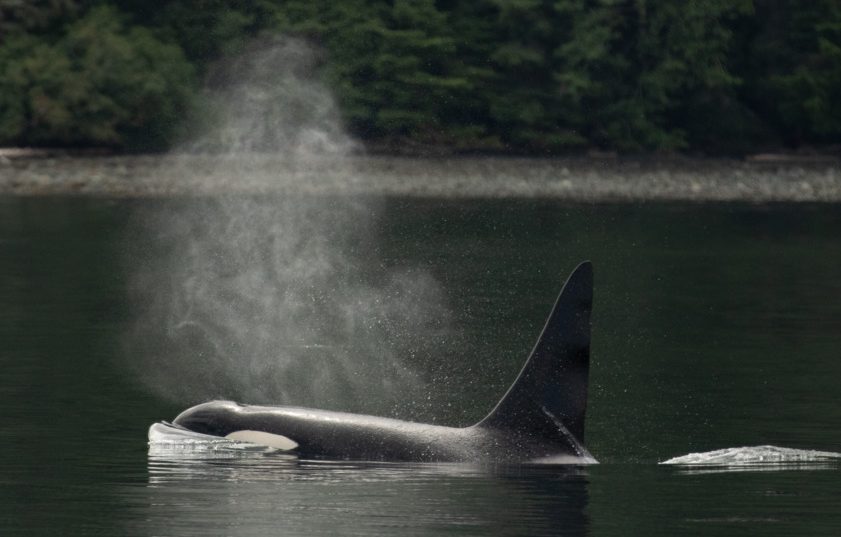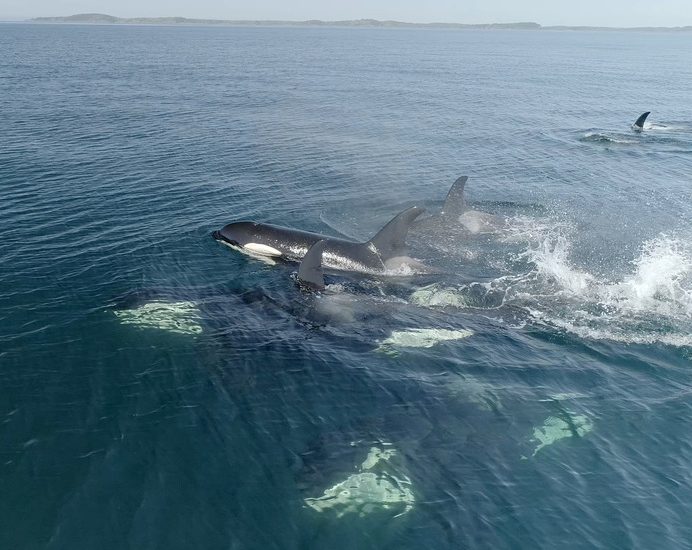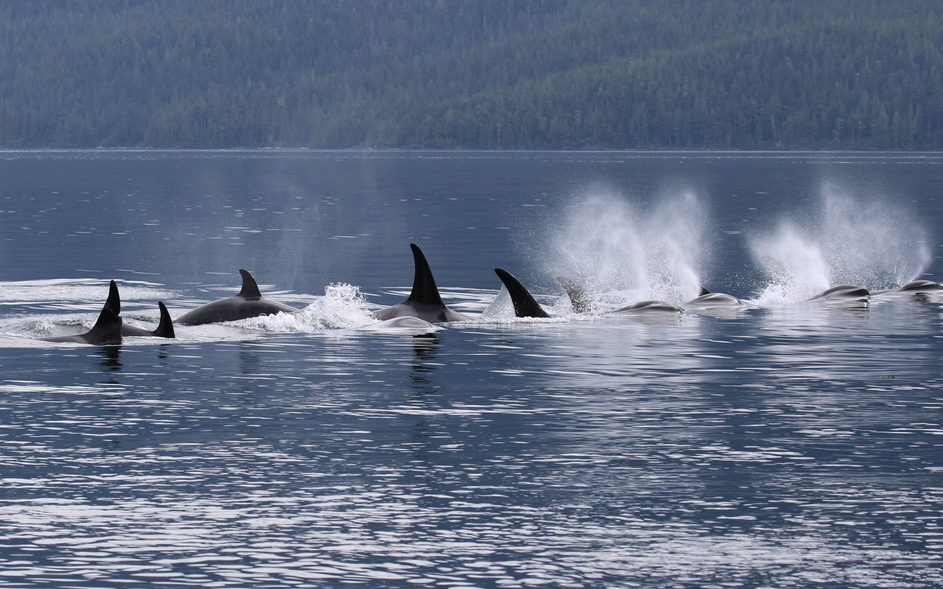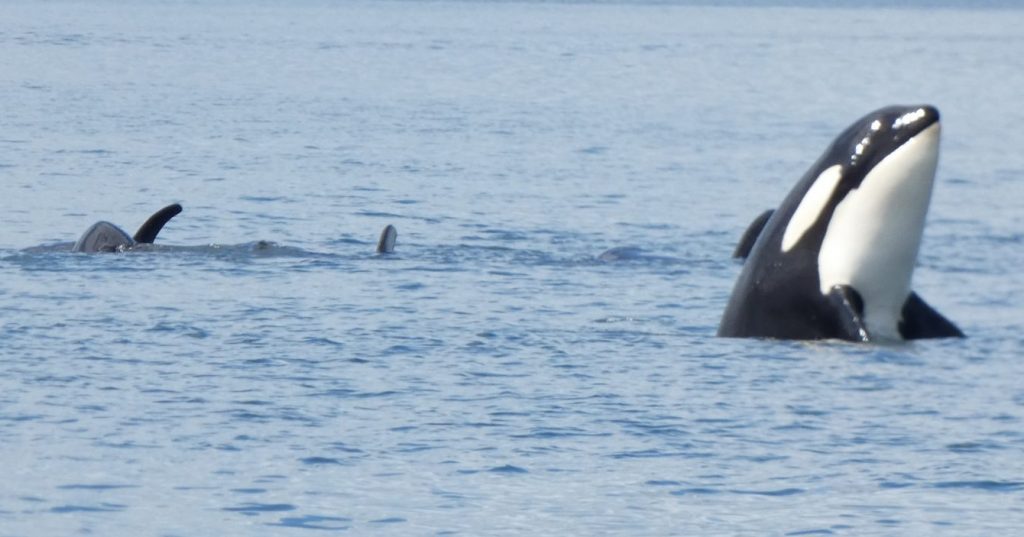Prof. Dr. Christian Bergler
For marine biologists, the interpretation and understanding of underwater audio recordings is essential. Based on such recordings, possible conclusions about behavior, communication and social interactions of marine animals can be made. Despite a large number of biological studies on the subject of orca vocalizations, it is still difficult to recognize a structure or semantic significance of the orca signals in order to be able to derive any patterns of behavior.

Due to a lack of techniques and computational tools, hundreds of hours of underwater recordings are still listened to by marine biologists in order to detect potential orca vocalizations. In a post process these identified orca signals will be analyzed and categorized. The main goal is to provide a robust method which is able to automatically detect orca calls within underwater audio recordings.

A robust detection of orca signals in connection with the associated situational video recordings and behaviour descriptions (provided by several researchers on site) can provide potential information about communication (kind of a language model) and behaviors (e.g. hunting, socializing). Furthermore, the orca signal detection algorithm can be used in conjunction with a localization software to provide the researchers on the field a more efficient way of searching orca populations. For more information about the project please contact me at christian.bergler@fau.de.

The joint efforts of the entire project team to decode the language of the Orcas will be featured on German television (3Sat). The documentation can be watched under the following link:
https://www.3sat.de/wissen/wissenschaftsdoku/die-sprache-der-wale-102.html

Since 04/2018: PhD Student, Pattern Recognition Lab, Friedrich-Alexander University Erlangen-Nürnberg
- Research focus on Deep Learning Applied to Animal Linguistics in particular the analysis of underwater audio recordings of marine animals (killer whales)
04/2016 – 03/2018: Software Engineer and external PhD Student (FAU), e.sigma Technology GmbH, Ilmenau
- Software developer for communication, voice processing, and guidance systems (automated speech recognition, text-to-speech systems, language model adaption)
03/2014 – 03/2016: Master of Engineering in Information Technology and Automation, Ostbayerische Technical University of Applied Science (OTH), Amberg – Weiden, Location: Amberg
- Focus on information technology
- Master thesis: Parametrization of various speaker characteristics for the generation of emotions within a High Quality Limited Domain Text – to – Speech – System (HQLD-TTS)
10/2010 – 03/2014: Bachelor of Engineering in Industrial Engineering, Ostbayerische Technical University of Applied Science (OTH), Amberg – Weiden, Location: Weiden
- Focus on mechanical engineering
- Bachelor thesis: Development of a freeTTS-based speech-synthesis system for the training of air traffic controllers
09/2009 – 07/2010: Vocational Diploma (Fachabitur), Berufsoberschule (BOS), Schwandorf
Teaching Experience
- since 03/2019: PhD Student, Friedrich-Alexander University Erlangen-Nürnberg (FAU)
- Exercises: Introduction to Pattern Recognition (IntroPR), Deep Learning
- Seminar: Automatische Analyse von Stimm-, Sprech- und Sprachstörungen bei Sprachpathologien
- Praktikum: Representation Learning
- 10/2011 – 06/2012: Student teaching assistant, Ostbayerische Technical University of Applied Science (OTH), Amberg – Weiden, Location: Weiden
- Modules: Mathematics/Statistics, Data Processing and Programming, Physics, Industrial Economics
Practical Experience
- 04/2016 – 03/2018: Software Engineer, e.sigma Technology GmbH, Ilmenau
- Automatic Speech Recognition (ASR) for Air Traffic Control (ATC)
- Controller Pilot Data Link Communication (CPDLC)
- Advanced Voice Processing (Text – to – Speech (TTS) Engine, limited Domain TTS Voice Creation)
- Communication Framework (VoIP Standard)
- Realtime Audio and Video Streaming
- Distributed System Communication via Message Broker Systems
- 08/2013 – 11/2015: Student trainee, e.sigma Technology GmbH, Ilmenau
- Software development, testing, maintenance, integration and documentation for the java-based freeTTS text-to-speech engine
- 08/2012 – 01/2013: Student trainee, Continental Automotive GmbH, Regensburg
- Support programming, integration and verification of Manufacturing Execution Systems (=MES) for all worldwide Continental
Chassis & Safety plants
- Support programming, integration and verification of Manufacturing Execution Systems (=MES) for all worldwide Continental
2018
-
Deep Learning Applied to Animal Linguistics
(FAU Funds)
Project leader: ,
Term: April 1, 2018 - April 1, 2022
Acronym: DeepALDeep Learning Applied to Animal Linguistics in particular the analysis of underwater audio recordings of marine animals (killer whales):For marine biologists, the interpretation and understanding of underwater audio recordings is essential. Based on such recordings, possible conclusions about behaviour, communication and social interactions of marine animals can be made. Despite a large number of biological studies on the subject of orca vocalizations, it is still difficult to recognize a structure or semantic/syntactic significance of orca signals in order to be able to derive any language and/or behavioral patterns. Due to a lack of techniques and computational tools, hundreds of hours of underwater recordings are still manually verified by marine biologists in order to detect potential orca vocalizations. In a post process these identified orca signals are analyzed and categorized. One of the main goals is to provide a robust and automatic method which is able to automatically detect orca calls within underwater audio recordings. A robust detection of orca signals is the baseline for any further and deeper analysis. Call type identification and classification based on pre-segmented signals can be used in order to derive semantic and syntactic patterns. In connection with the associated situational video recordings and behaviour descriptions (provided by several researchers on site) can provide potential information about communication (kind of a language model) and behaviors (e.g. hunting, socializing). Furthermore, orca signal detection can be used in conjunction with a localization software in order to provide researchers on the field with a more efficient way of searching the animals as well as individual recognition.
For more information about the DeepAL project please contact christian.bergler@fau.de.
2024
Conference Contributions
- , , , , :
Robust Classification of Parkinson’s Speech: an Approximation to a Scenario With Non-controlled Acoustic Conditions
27th International Conference on Text, Speech, and Dialogue, TSD 2024 (Brno, CZE, September 9, 2024 - September 13, 2024)
In: Elmar Nöth, Aleš Horák, Petr Sojka (ed.): Lecture Notes in Computer Science (including subseries Lecture Notes in Artificial Intelligence and Lecture Notes in Bioinformatics) 2024
DOI: 10.1007/978-3-031-70566-3_22
BibTeX: Download
2023
Journal Articles
- , , , , , , , , :
ORCA-SPY enables killer whale sound source simulation, detection, classification and localization using an integrated deep learning-based segmentation
In: Scientific Reports 13 (2023), Article No.: 11106
ISSN: 2045-2322
DOI: 10.1038/s41598-023-38132-7
BibTeX: Download - , , , , , , , :
Classification of stuttering – The ComParE challenge and beyond
In: Computer Speech and Language 81 (2023), Article No.: 101519
ISSN: 0885-2308
DOI: 10.1016/j.csl.2023.101519
BibTeX: Download - , , , , , , , , , , , , , , , , , , , :
A summary of the ComParE COVID-19 challenges
In: Frontiers in Digital Health 5 (2023), Article No.: 1058163
ISSN: 2673-253X
DOI: 10.3389/fdgth.2023.1058163
BibTeX: Download - , , , , , , :
Open-source workflow approaches to passive acoustic monitoring of bats
In: Methods in Ecology and Evolution (2023)
ISSN: 2041-210X
DOI: 10.1111/2041-210X.14131
BibTeX: Download - , , , , , , , , :
ORCA-SPY: Killer Whale Sound Source Simulation and Detection, Classification and Localization in PAMGuard Utilizing Integrated Deep Learning Based Segmentation
In: Scientific Reports UNDER REVIEW (2023)
ISSN: 2045-2322
BibTeX: Download
Thesis
- :
Deep Learning Applied to Animal Linguistics (Dissertation, 2023)
URL: https://open.fau.de/handle/openfau/23926
BibTeX: Download
2022
Journal Articles
- , , , , , , , , , , , , , , :
ANIMAL‐SPOT enables animal‐independent signal detection and classification using deep learning
In: Scientific Reports 12 (2022), p. 1-16
ISSN: 2045-2322
DOI: 10.1038/s41598-022-26429-y
BibTeX: Download
Conference Contributions
- , , , , , , , , , , , , , , :
The ACM Multimedia 2022 Computational Paralinguistics Challenge: Vocalisations, Stuttering, Activity, & Mosquitoes
30th ACM International Conference on Multimedia (Lisbon, Portugal, October 10, 2022 - October 14, 2022)
In: Proceedings of the 30th ACM International Conference on Multimedia 2022
DOI: 10.1145/3503161.3551591
BibTeX: Download - , , , , , :
ORCA-WHISPER: An Automatic Killer Whale Sound Type Generation Toolkit Using Deep Learning
23nd Annual Conference of the International Speech Communication Association, INTERSPEECH 2022 (Incheon, Korea, September 18, 2022 - September 22, 2022)
In: Proceedings of the Annual Conference of the International Speech Communication Association, INTERSPEECH 2022 2022
DOI: 10.21437/interspeech.2022-846
BibTeX: Download - , , , , , :
ORCA-PARTY: An Automatic Killer Whale Sound Type Separation Toolkit Using Deep Learning
International Conference on Acoustics, Speech, and Signal Processing (ICASSP) (Singapore, May 22, 2022 - May 27, 2022)
In: ICASSP 2022 - 2022 IEEE International Conference on Acoustics, Speech and Signal Processing (ICASSP) 2022
DOI: 10.1109/icassp43922.2022.9746623
BibTeX: Download
2021
Journal Articles
- , , , , , , , :
FIN-PRINT a fully-automated multi-stage deep-learning-based framework for the individual recognition of killer whales
In: Scientific Reports 11 (2021), p. 1-16
ISSN: 2045-2322
DOI: 10.1038/s41598-021-02506-6
BibTeX: Download - , , , , , , , , , :
EXACT: a collaboration toolset for algorithm-aided annotation of images with annotation version control
In: Scientific Reports 11 (2021), Article No.: 4343
ISSN: 2045-2322
DOI: 10.1038/s41598-021-83827-4
BibTeX: Download - , , , , , , , , , , :
Face mask recognition from audio: The MASC database and an overview on the mask challenge
In: Pattern Recognition 122 (2021), p. 108361
ISSN: 0031-3203
DOI: 10.1016/j.patcog.2021.108361
BibTeX: Download
Conference Contributions
- , , , :
InSE-NET: A Perceptually Coded Audio Quality Model based on CNN
151st Audio Engineering Society (AES) Convention (Las Vegas, Nevada, USA, October 11, 2021 - October 13, 2021)
In: Audio Engineering Society Convention 151 2021
BibTeX: Download - , , , , , , , :
ORCA-SLANG: An Automatic Multi-Stage Semi-Supervised Deep Learning Framework for Large-Scale Killer Whale Call Type Identification
22nd Annual Conference of the International Speech Communication Association, INTERSPEECH 2021 (Brno, Czechia, August 30, 2021 - September 3, 2021)
In: Proceedings of the Annual Conference of the International Speech Communication Association, INTERSPEECH 2021 2021
DOI: 10.21437/Interspeech.2021-616
BibTeX: Download - , , , , , , , , , , , , , , , , , , , , , , , :
The INTERSPEECH 2021 Computational Paralinguistics Challenge: COVID-19 Cough, COVID-19 Speech, Escalation & Primates
22nd Annual Conference of the International Speech Communication Association, INTERSPEECH 2021 (Brno, Czechia, August 30, 2021 - September 3, 2021)
In: Proceedings of the Annual Conference of the International Speech Communication Association, INTERSPEECH 2021 2021
DOI: 10.21437/Interspeech.2021-19
BibTeX: Download
2020
Conference Contributions
- , , , , , :
ORCA-CLEAN: A Deep Denoising Toolkit for Killer Whale Communication
21th Annual Conference of the International Speech Communication Association: Cognitive Intelligence for Speech Processing, INTERSPEECH 2020 (Shanghai, China, October 25, 2020 - October 29, 2020)
In: Proceedings of the Annual Conference of the International Speech Communication Association, INTERSPEECH 2020 2020
DOI: 10.21437/Interspeech.2020-1316
BibTeX: Download - , , , , , , , , , , , , :
The INTERSPEECH 2020 Computational Paralinguistics Challenge: Elderly Emotion, Breathing & Masks
21th Annual Conference of the International Speech Communication Association: Cognitive Intelligence for Speech Processing, INTERSPEECH 2020 (Shanghai, China, October 25, 2020 - October 29, 2020)
In: Proceedings of the Annual Conference of the International Speech Communication Association, INTERSPEECH 2020 2020
DOI: 10.21437/Interspeech.2020-0032
BibTeX: Download
2019
Journal Articles
- , , , , , , , :
ORCA-SPOT: An Automatic Killer Whale Sound Detection Toolkit Using Deep Learning
In: Scientific Reports 9 (2019), p. 1-17
ISSN: 2045-2322
DOI: 10.1038/s41598-019-47335-w
BibTeX: Download
Conference Contributions
- , , , , , :
Segmentation, Classification, and Visualization of Orca Calls Using Deep Learning
International Conference on Acoustics, Speech, and Signal Processing (ICASSP) (Brighton, May 12, 2019 - May 17, 2019)
In: ICASSP 2019 - 2019 IEEE International Conference on Acoustics, Speech and Signal Processing (ICASSP) 2019
DOI: 10.1109/ICASSP.2019.8683785
URL: https://ieeexplore.ieee.org/abstract/document/8683785
BibTeX: Download - , , , , :
Analysis by adversarial synthesis - A novel approach for speech vocoding
20th Annual Conference of the International Speech Communication Association: Crossroads of Speech and Language, INTERSPEECH 2019 (Graz, AUT, September 15, 2019 - September 19, 2019)
In: Gernot Kubin, Thomas Hain, Bjorn Schuller, Dina El Zarka, Petra Hodl (ed.): Proceedings of the Annual Conference of the International Speech Communication Association, INTERSPEECH 2019
DOI: 10.21437/Interspeech.2019-1195
BibTeX: Download - , , , , , :
Deep Learning for Orca Call Type Identification – A Fully Unsupervised Approach
20th Annual Conference of the International Speech Communication Association: Crossroads of Speech and Language, INTERSPEECH 2019 (Graz, September 15, 2019 - September 19, 2019)
In: Gernot Kubin, Thomas Hain, Bjorn Schuller, Dina El Zarka, Petra Hodl (ed.): Proceedings of the Annual Conference of the International Speech Communication Association, INTERSPEECH 2019
DOI: 10.21437/Interspeech.2019-1857
BibTeX: Download - , , , , , , , :
Deep Representation Learning for Orca Call Type Classification
22nd International Conference on Text, Speech, and Dialogue, TSD 2019 (Ljubljana, September 11, 2019 - September 13, 2019)
In: Kamil Ekštein (ed.): Text, Speech, and Dialogue, 22nd International Conference, TSD 2019, Ljubljana, Slovenia, September 11–13, 2019, Proceedings 2019
DOI: 10.1007/978-3-030-27947-9_23
BibTeX: Download - , , , , , , , , , , , , , , , , , :
The INTERSPEECH 2019 Computational Paralinguistics Challenge: Styrian Dialects, Continuous Sleepiness, Baby Sounds & Orca Activity
20th Annual Conference of the International Speech Communication Association: Crossroads of Speech and Language, INTERSPEECH 2019 (Graz, AUT, September 15, 2019 - September 19, 2019)
In: Gernot Kubin, Thomas Hain, Bjorn Schuller, Dina El Zarka, Petra Hodl (ed.): Proceedings of the Annual Conference of the International Speech Communication Association, INTERSPEECH 2019 2019
DOI: 10.21437/Interspeech.2019-1122
BibTeX: Download
No matching records found.


